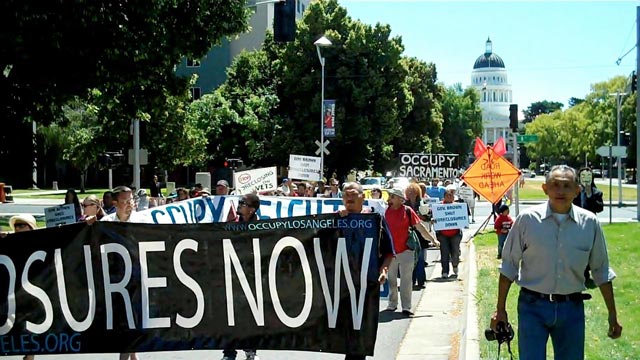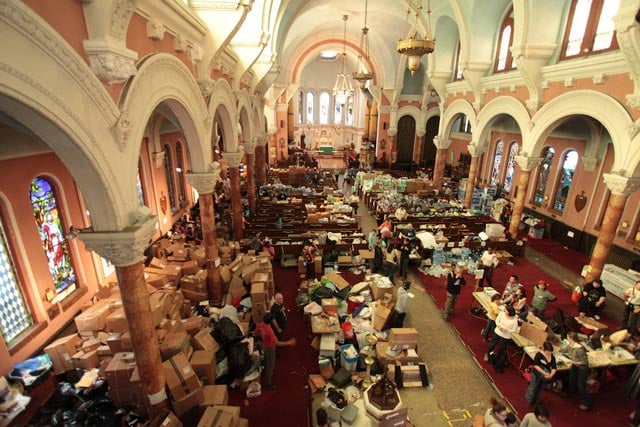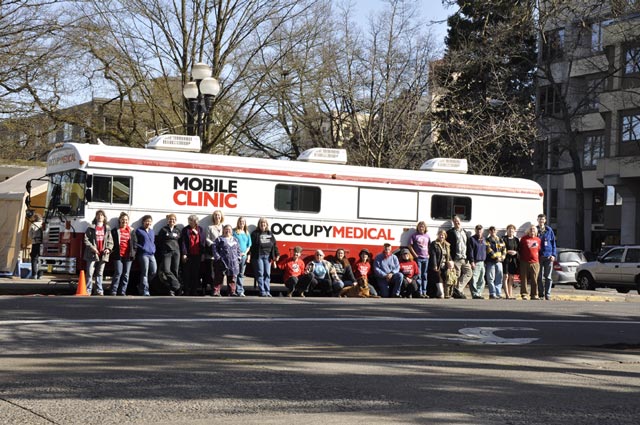
On the 3-year anniversary of the Occupy Wall St. movement in Zuccotti Park, many people are wondering, “What has Occupy done?” Have protesters created any projects, models or solutions after their camp evictions? Below is a list of just 10 ongoing successes Occupiers around the world have began.
10. Bank Transfer Day 2011
 (Photo: The New York Times)
(Photo: The New York Times)
On November 5, 2011, credit unions across the US anticipated for Bank Transfer Day: a national day of action for customers to move their money from big banks into smaller, more transparent institutions. Occupy camps joined and spread the word, and helped to facilitate over $50 million in loss for big banks. Occupy Buffalo (NY) took it one step further and convinced the City of Buffalo to divest $45 million in Sewer funds from JPMorgan Chase.
9. Rolling Jubilee
 (Photo: Nation of Change)
(Photo: Nation of Change)
The Rolling Jubilee fund, from Occupy-founded Strike Debt, mimics the debt collection industry by buying defaulted loans at discount prices from online donations they raised – all to cancel it. By Nov. 2013, they have canceled over $14.7 million in medical debt with just $0.6 million in donations. On Sept. 16, 2014, they announced their debt buy of nearly $4 million in student loans to the for-profit institution Everest College.
8. Occupy our Homes/Occupy Fights Foreclosures
 (Photo: Occupy Fights Foreclosures)
(Photo: Occupy Fights Foreclosures)
Occupy our Homes and Occupy Fights Foreclosures are just two projects in the home defense movement fighting to keep people sheltered after the housing bubble crash. They have launched hundreds of anti-foreclosure campaigns virtually and on-the-ground to defend homeowners and their neighbors.
7. Occupy Sandy
 (Photo: Occupy Sandy)
(Photo: Occupy Sandy)
Occupy Sandy revolutionized crisis response by offering a decentralized alternative to FEMA and the National Guard after Superstorm Sandy. While larger charities left, Occupy Sandy continues to build grassroots development with residents, such as worker-owned cooperatives in Far Rockaway, while raising awareness on climate change.
6. Facilitating candidacy
While many Occupy camps remained strictly non-electoral, with reactions like Occupy Wall St.’s Statement of Autonomy, individual protesters were emboldened to run for local offices. One protester and economics professor, Kshama Sawant, won a seat in the Seattle City Council as a explicitly socialist candidate under the banner of minimum wage increases.
5. Occupy Madison Build (WI)
Participating in the “Small Homes Movement,” Occupy Madison Build is creating small, 100 sq. ft. living spaces for the homeless as part of a larger push for alternative development. Many Occupy camps experienced influxes of their local homeless populations, as they increased dramatically from the 2008 financial crisis.
4. Occupy Medical (OR)
 (Photo: Occupy Medical)
(Photo: Occupy Medical)
More than 50 medical professionals are on reserve weekly for Occupy Medical: a free, mobile street clinic offering emergency and preventative care since the Occupy Eugene, OR camp. They have received numerous awards from their local Lane County, and is connected with the single-payer healthcare movement in Oregon.
3. Occupy the Farm: Gill Tract
In Apr. 2012, Bay Area protesters occupied and farmed the Gill Tract site in Albany, CA: the scene of a long history of negotiations between residents, NGOs and students and the UC Berkeley administration. Since 1997, proposers requested UC Berkeley to designate Gill Tract as a center for sustainable agriculture, with little results. The occupation helped UC Berkeley’s College of Natural Resources to readdress the issue, as land is now being claimed gradually.
2. International Success
From the online decision-making tool Loomio, to Occupy Parliament week of action in Oct. 2014 in London, to Occupy Central in Hong Kong, protests and campaigns across the world are continuing to evoke Occupy’s legacy and tactics.
1. Raising Awareness
For Gallup polls and media pundits, “raising awareness” may be the only success the Occupy movement is accredited for. But even for “raising awareness,” the results can be surprising: Google Trends show a near threefold jump in the search term “income inequality” during late 2011, during the camps. The American Dialect Society deemed “Occupy” to be the 2011 Word of the Year.
Media that fights fascism
Truthout is funded almost entirely by readers — that’s why we can speak truth to power and cut against the mainstream narrative. But independent journalists at Truthout face mounting political repression under Trump.
We rely on your support to survive McCarthyist censorship. Please make a tax-deductible one-time or monthly donation.